#shingeki no kyojin meta
Text
Levi, Emotional Expression, and Social Interaction
I've seen different posts on Levi lately across different platforms that claim he is a cruel or mean person, which are fundamental misunderstandings of his character. I sort of see the problem as people mistaking Levi's emotional expressions (or lack thereof) as indicative of malicious intent or rude behavior. As such, I wanted to discuss how Levi's history and trauma have shaped how he expresses himself and relates to others. Once one has an understanding of that, it becomes evident that Levi's expressions should not be used to judge his intentions or feelings.
I wrote another post on how Levi fully meets the criteria for post-traumatic stress disorder (PTSD) on my main blog, and that diagnosis is important for understanding Levi as a character, as he's someone who's been largely affected by his trauma. To further expand on that post, we're going to discuss both Levi's affect and his ways of socially interacting with others, using concepts such as social modeling and self-monitoring.
What is Emotional Affect?
Affect, in psychology, refers to a patient's expression of emotion. Expression of emotion encompasses facial expressions, gestures, body language, tone of voice, etc. Mood, on the other hand, refers to the internal state of a patient's emotions sustained over a period of time. Affect helps us interpret a person's mood; however, there are such situations where affect can be considered inappropriate—that is, the person's affect is not entirely congruent (i.e., consistent) with the person's present mood and/or situation. A classic example of inappropriate affect would be laughing at a funeral, as that is incongruent with the context of the situation. Another example—a patient who is smiling and laughing after being involuntarily committed is considered to have an inappropriately euphoric affect.
Affect can be described across multiple dimensions, but the two most typically used are the quality of affect and the range of affect. Quality of affect is typically categorized as either euthymic (normal), dysthymic (depression, anxiety, guilt), or euphoric (an abnormally elevated sense of well-being, such as in mania). The range of affect can be labeled as labile, broad, restricted, blunted, or flat. Broad is considered the normal range of affect.
For the purposes of conciseness, we're going to focus on blunted and flat affects, as those are the range of affects that are best suited to describing Levi. Flat affect is when there is no variation in the patient's emotional expressions, regardless of their mood and situation. Blunted affect is similar, but it is a bit less severe—it means minimal variation. Practically, what do these mean?
Levi's Affect
When Kenny first finds Levi as a child, Levi is in a severe state of neglect; he is dying of starvation, he is wearing rags, his hair is unkempt, and he is sitting in the same room as his mother's decaying corpse. A typical child in this developmental range would be in extreme distress: crying, expressing fear, pleading for help, etc. However, Levi shows no such displays of emotions; he does not cry, he does not move, and he barely speaks. In fact, there is absolutely zero emotional expression, and there is no indicator he is upset about his situation (even as it is clear he must be). This is flat affect. Even in the short montage we see after Kenny has taken Levi under his "care", Levi never once shows variation in his emotional expression—no anger, no laugher, nothing.
Once Levi is an adult during the present timeline in the series, Levi exceedingly rarely displays his emotions. He often speaks in monotone, minimally varying the tone or volume of his voice—never yelling as well, even when angry. His smiles are so rare that it's a notable moment when he does smile (such as when Historia punched him at end of the "Royal Government" arc), and he never cries even after significant personal losses (except his one tear at the end of the series). His affect as an adult ranges from flat to blunted. This is significant too because we do know that his mood does vary, as it's clear from his verbal and body language the toll that different events take on him, and he does also display a sense of humor across the series. Again, though, his emotional expression does little to reflect how he's feeling.
What Causes Flat Affect?
To give a quick list of the most common causes:
Schizophrenia and other psychotic-spectrum disorders
Brain damage, such as from organic brain pathology or a traumatic brain injury
Neurodevelopmental disorders, such as autism spectrum disorder (ASD)
Severe psychological trauma, typically resulting in post-traumatic stress disorder
Major Depressive Disorder (MDD)
I will say outright that there is no evidence Levi suffers from schizophrenia, and thus, that is unlikely to be the cause of his flat/blunted affect, especially given the onset of Levi's flat affect and the exceeding rarity of childhood-onset schizophrenia. Similar reasoning applies to brain damage, so both of those can be excluded from the differential.
I do believe Levi meets the criteria for MDD in adulthood; however, that would be more so a comorbidity of his existing PTSD. Levi looked to be around 4-6 years of age at the start of Kenny's flashbacks, and MDD in that age group is quite uncommon, even when accounting for childhood-onset and adolescent-onset depression.
This leaves us with both severe psychological trauma and ASD as the two most likely causes of Levi's flat affect as a child and through adulthood. ASD can be a valid interpretation of Levi's significantly reduced affect display during childhood, as well as his consistent social difficulties throughout all of canon. Based on criteria laid out by the latest edition of the Diagnostic and Statistical Manual of Mental Disorders (DSM-5-TR), Levi can be seen as having ASD (which I'll likely make a future post on). However, the presence of severe psychological trauma confounds this diagnosis. Despite this confounding diagnosis, it is still possible he has both PTSD and ASD.
Regardless, the most likely explanation for Levi's range of affect remains severe psychological trauma. In a child that young, something had to have gone extremely wrong in his early upbringing for his significantly reduced affect display. An entire separate post can be written on this topic, but Levi demonstrates clear signs of an insecure attachment style by the time he's discovered by Kenny; this indicates that Kuchel, despite having loved Levi, was simply unable to properly care for him, and this resulted in deep and ingrained psychological trauma that affected Levi's ability to socially relate and interact with others for the rest of his life. I intend on going into more detail in a separate post, but Levi's attachment style is likely insecure-avoidant or insecure-disorganized.
Observational Learning and Social Modeling
Albert Bandura's social learning theory posits that children learn through a combination of traditional behaviorist processes (classical and operant conditioning), cognitive processes, in addition to observation and modeling. In reference to Levi, observational learning is the most salient aspect of this theory.
In simple terms, observational learning refers to the way children observe the people around them. Individuals observed are referred to as models. Models can include, but are not limited to, parents/caregivers, TV characters, school teachers, and friends within a peer group. Basically, children pay attention to these models and encode their behavior into their memory. At a later time, this behavior is then imitated. This is referred to as "social modeling".
Who were Levi's models? Kuchel, Kuchel's patrons at the brothel she worked at, Kenny, and others who lived in or frequented the Underground City.
Given Kuchel's circumstances and the danger of human trafficking in the Underground, it is likely she taught Levi to avoid interacting with anyone in order to ensure his safety. Kuchel's patrons, in all likelihood, abused her and Levi was most assuredly witness to this abuse or the effects of it in some way. Then, Kenny—Levi's most significant parental figure—was a prominent serial killer who displayed and actively taught Levi violence.
All of this points to Levi never having had the opportunity to learn proper social interaction. In fact, he was actively taught inappropriate and unhealthy ways to socially interact. Not only was Levi's emotional development stunted and severely impacted as shown through his lack of affect, but his ability to socially interact and relate to others was inhibited due to both his insecure attachment and the absence of appropriate social models. How does this manifest in Levi?
Self-Monitoring
Self-monitoring is the degree to which people monitor and adjust their self-presentations when interacting with others and across different social contexts. Whether someone is a high or low self monitor can be affected by their natural personality, their experiences growing up, and/or their neuropsychobiology.
High self monitors tend to be actively aware of the social image they are projecting, and they will be adept at responding to social cues. They will also vary the image they project dependent upon who they are interacting with and what the social circumstances are. They have greater concern over situational appropriateness, and they are often perceived as more friendly and pleasant by others.
In contrast, low self monitors tend to exhibit emotional expressiveness and social responses more congruent with their internal states regardless of social context. That is, they do not adjust their beliefs, attitudes, and dispositions to be more socially acceptable. As such, they are often perceived as rude, socially awkward, and/or unaware of others' social needs.
Levi is a low self monitor. Regardless of who he is interacting with or what the situation is, he consistently maintains the same attitudes and beliefs; he is always honest and says what he's feeling. He never adjusts his social tone, even when it would make him more appeasing to others. Throughout the series, he's often referred to as rude, socially awkward, a lunatic, etc. for his inability to self-monitor. This is a likely a result of the aforementioned psychological trauma, his lack of appropriate social models, his innate introverted nature, and his potential ASD.
Summary
My goal with this post was to explain how Levi's trauma and experiences growing up have formed the way he expresses himself and interacts with others. Levi never sets out to be seen as rude, unkind, or cruel. In fact, I'd say he is by far the kindest and most compassionate character in all of Attack on Titan. However, because of his social disposition, he is consistently misperceived by both characters in the series, as well as readers/viewers. Levi, through a combination of his innate nature and the environment in which he grew up, simply lacks the social skills and affinity for social interaction to properly explain himself and come across as more palatable to others.
Note: I am a doctor of psychology student, so much of this information has been informed by my schooling.
#attack on titan#shingeki no kyojin#levi ackerman#aot#snk#attack on titan meta#shingeki no kyojin meta#Levi Ackerman meta#aot.text#aot.meta#my thoughts#c: levi ackerman#meta.levi#text.levi
119 notes
·
View notes
Text
Allow me a very light-hearted and light-headed shippy post.
About Her:
She wants to lay low, do what she has to do, and get back home without being noticed
Of course that doesn’t happen; she’s too skilled
Skills she’s been taught by her adoptive father, and she’s very proud of them
A parental figure reared her to sell her body in order to make money off of her, and she opposed it fiercely
She shows limited emotionality, but in truth, she’s very empathetic and will help her friends in need
But she knows her place in the world; she knows she has to keep her head down and accept the system and hope she does survive, because she cares about surviving
Spiritually, she’s a cat
About Him:
He has to carry the world on his shoulders; great expectations are laid upon him
His natural parents have abandoned him out of certain circumstances and decisions made “for his good” and he’s been brought up in the house of his grandfather instead
He has charisma and uses his words and his smiles to bend the favor of the people around him
He’s been trained as a soldier but does not show it for his ways are very sweet, his appearance demure
Constantly overworked; the man needs a nap! (And has to be tricked in order to sleep)
Are these the reasons I like
AruAni, or just the essence of MaoMao x Jinshi? (Both!)
(And the fun thing is that the points in common are so blatant while the characters are completely different.)
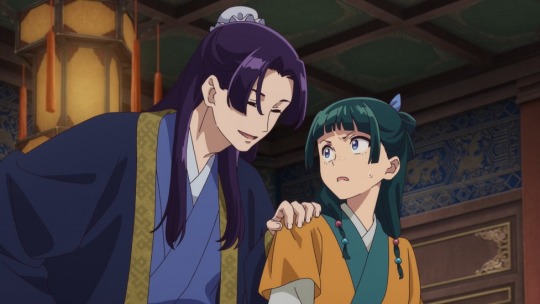
#not me trying to mix (up) my fandoms again#i'm sorry i just needed to share#these are not spoilers heh#armin arlert#annie leonhart#aruani#shingeki no kyojin meta#annie x armin#the apothecary diaries#kusuriya no hitorigoto#jinmao#maomao x jinshi#i feel so silly now
70 notes
·
View notes
Text
Eren and Cinder: Slaves of Freedom
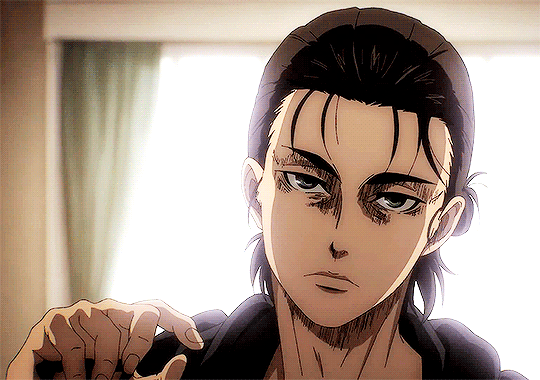
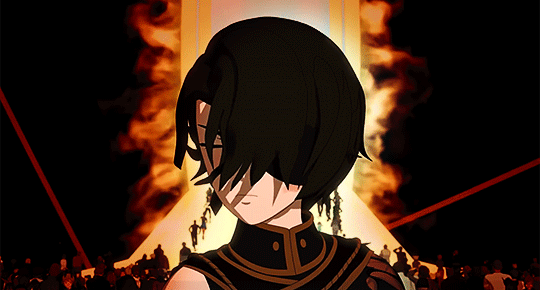
Many people hate Eren and Cinder to the point that they consider them bad characters and it's one thing to dislike a character and another to be badly written and to be fair, Eren and Cinder aren't bad characters. You might dislike them, very much actually, but one thing doesn't take away the other, they're both well written and I'm writing this because I don't want people to think they're bad characters just because they don't like them.
They both share a strong desire for freedom and in this post I'm going to explore their desire for freedom, why they became obsessed with being free as well as other things they share:
Eren and Cinder suffered since they were children due to situations that were beyond their control. Eren witnessed the destruction of his home and the death of his mother Carla as well as being turned into a titan by his father Grisha and later on he would suffer a series of betrayals and find out that everything bad that happened to him was the product of a war that he did not even know existed and Cinder was mistreated on the farm where she was sheltered until Madame adopted her but this mistreatment went from bad to worse, then Rhodes gives her hope of being free as a huntress but she could not bear the abuse and she kills her abusers and then fights Rhodes and kills him.
Both situations are quite different but the effect it caused on both is practically the same: they hate themselves for their impotence and want to be free because they want to have control of their lives, give meaning to all pain they went through and believe that power and violence is the only thing that can give them what they want. Eren and Cinder are victims of a system bigger than them that failed them and they choose to destroy it but at the cost of being left alone in a toxic and self-destructive cycle.
Basically, this is how they want to be seen by others (powerful and untouchable)
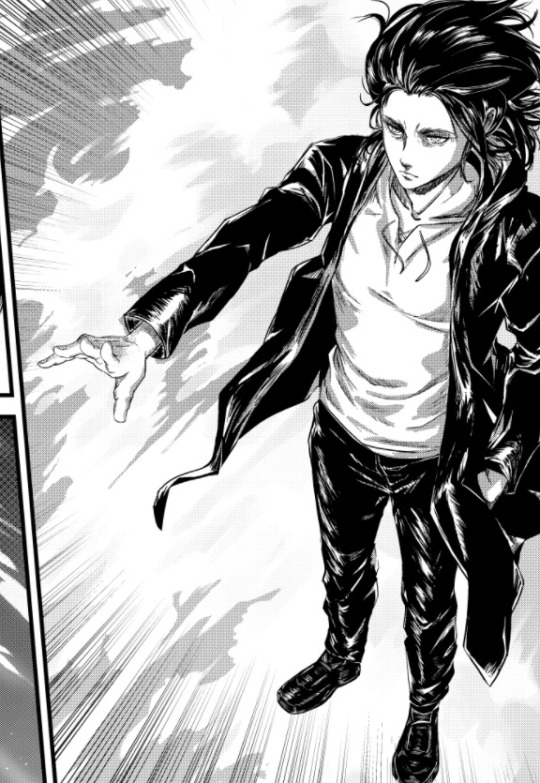

because this is what they really are (pathetic and unsure of themselves)
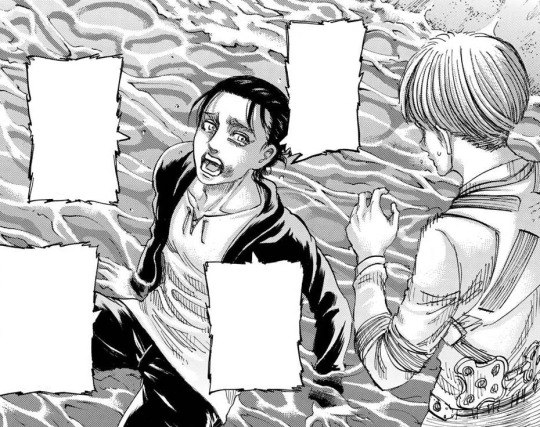

and they know it better than anyone and they hate themselves for it. They're irrational, immature, angry, cowardly in many ways, yet also a frightened children deep down.
Their desire to be free through violence, to have power, and to have a narrative they're in control of has caused them to enter a self-destructive spiral and ironically they become slaves to their desire for freedom to the point that they lose sight of what that they really want (to be loved) and cut off the few positive relationships they have left, taking them away from what they really want.
Cinder only gets close to others for her own benefit and while she projects onto Emerald and Mercury and feels some affection for them, in the end she chooses to abuse and manipulate them and despite Eren genuinely loving his friends but in turn abusing them, he hits them and forces them to do things they don't want to do, Cinder and Eren both share a main flaw when it comes to their relationships and that is that they're afraid of loving other people, afraid of showing vulnerability, they don't trust others because they don't want to be hurt again. Their relationships are selfish love because they are based on how they feel without taking into account the feelings of others. This is so to the point that they also affect people with whom they have no close relationship because they steal agency because they have been deprived of it.
If you notice, Eren and Cinder seek to have a narrative like the trope of the chosen one: one person is a failure and having a series of horrible things happen to them only to realize that they were special for being the chosen one all along but to Eren and Cinder's disgrace they're not chosen but are a deconstruction of this trope.
Eren experienced a series of misfortunes and betrayals, he receives a power that shortens his life expectancy to 13 years and on top of that the whole world wants to destroy his home because of a war that he didn't know existed but wants to believe that he is the chosen one who was destined to activate the Rumbling and that there was no other solution to save his island. On the other hand, Cinder was abused her entire life and felt betrayed by the father figure who inspired her until Salem arrives and grants her the ability to be a Maiden (which is quite a dangerous position since many seek her power either through the power itself, the relics, or both) being left in an abusive situation with her and Cinder chooses to believe that she was meant to be the one chosen to have the Maiden's Powers.
They seek to be special because they hate themselves and they want power because they want control of their lives. They would rather be monsters that everyone fears
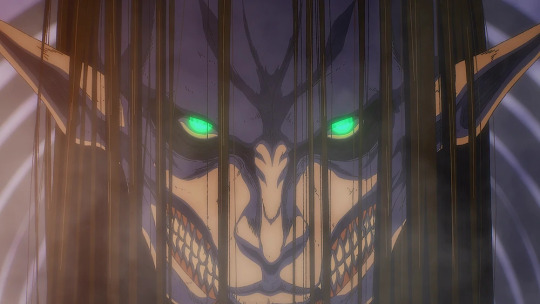
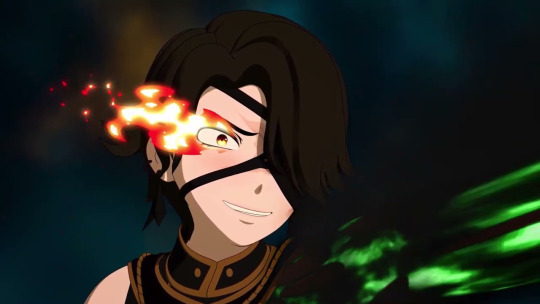
than admit that they're just traumatized and wounded children.
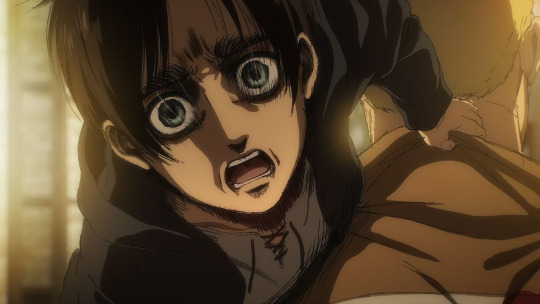
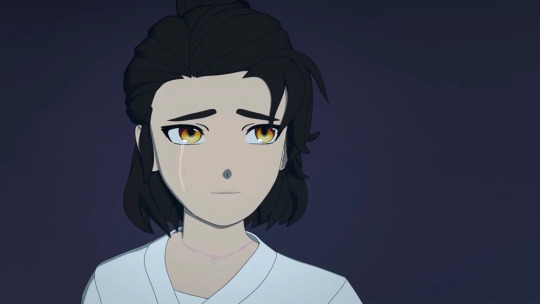
After all, what kind of person wanted to become a monster anyway?
A person pathetically unable to feel good as a human being.
We see that this deconstructed trope, far from being something good and rewarding, is actually dehumanizing. Eren knows that his mother's death was circumstantial but chooses to believe that he caused it and planned it only to feel like he was in control and Cinder chooses to believe that her role as Maiden is her destiny and that she destroyed the kingdom she hated to feel that it was by her own choice when actually everything was planned and decided by Salem.
Eren and Cinder are fascinating because of how contradictory they are, they want to be free but at the same time they want to adjust to a narrative where everything is decided for them. They both think that way because they believe that freedom consists of doing what they want without consequences, but what they don't know about freedom is this:
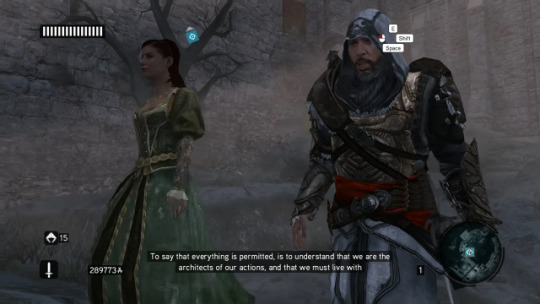

Here Ezio is explaining the meaning of "everything is permitted" from the assassins creed which is basically the meaning of having freedom. Freedom consists of making choices and taking responsibility for the consequences of those choices, but Eren and Cinder don't make their own decisions and when they do they don't want to take responsibility for them. They want the feeling of power and control that comes with choice, but they don't want the responsibility for it.
Eren knows about the world situation regarding Paradis and he wanted to protect his friends and home but deep down he just wanted revenge against the world and the system that hurt him. He didn't want the world to be destroyed but he wanted to be the one to make that choice.
Cinder knows about the situation of the world of Remnant with the classism and discrimination that she and many others suffered and decided to perpetuate the cycle because she wanted revenge against a system that failed her. She doesn't care about the state of the world but she wanted to be important and Cinder, like Eren, is going to make a choice about the world but in turn she has the opportunity to make a different choice than Eren.
In a sense, Eren represents what could happen to Cinder if she doesn't realize her way of thinking that she has to be the chosen one to prove her worth as a person and not acknowledge her pain and the pain she caused others will get her nowhere. She needs to realize that she doesn't need to prove her worth but to acknowledge that she is already valuable and special just by existing, which Eren failed to do. Eren was called to realize it by his friends but he failed because he prioritize his self-loathing and anger against the world while Cinder will be called (possibly by Emerald and Mercury) to realize this and she will listen.
While Eren condemns himself by wanting to continue with his flaw (being afraid to love others, wanting to feel better about himself by hurting others and being special because his childish delusions of grandeur and his inability to let go of his childish feelings of entitlement) and not being able to grow, Cinder will grow as a person and overcome these same flaws. Both are very related to the final destiny of the world, except that Eren ultimately chooses to destroy his while Cinder ultimately will chooses to save it. Eren's choice was selfish and Cinder's will be selfless. Eren chooses to die because he cannot deal with the responsibility of his choice while Cinder will choose to die to save the world and will hold on to her final choice even knowing the consequences of taking it.
Eren died as a slave to his need to seek freedom and to feel better about himself in a chosen narrative but Cinder will die truly free for the first time in her life by recognizing what she really wants (to be loved, make her own choices and hold on to them with all the responsibility that entails).
#snk meta#aot meta#shingeki no kyojin meta#attack on titan meta#rwby meta#snk#shingeki no kyojin#aot#attack on titan#rwby#snk spoilers#shingeki no kyojin spoilers#attack on titan spoilers#aot spoilers#rwby spoilers#snk analysis#shingeki no kyojin analysis#aot analysis#attack on titan analysis#rwby analysis#eren jaeger#eren yeager#cinder fall
57 notes
·
View notes
Text
So I finished my third re-watch of the aot finale. What hurt me the most in this scene was Armin's eyes.







Absolute devastation. Because when Eren rumbled most of the world outside, it was also Armin's dream that got crushed, wasn't it? His dream of seeing the outside world, now gone to ruins. Armin, who always saw the beauty in everything, who was content enough to chase his friends up a hill, but also was the brightest source of igniting hopes and dreams within the 104th, now left with barren lands and seas of blood.
And yet he still chooses to follow Eren to hell, because he takes on the responsibility of showing Eren the book in the first place.
Absolute devastation.
#i didnt wake up on the right side of the bed today morning#welp#armin arlert#eren jaeger#attack on titan#shingeki no kyojin#aot#snk#meta#??
1K notes
·
View notes
Text
I think what I like in particular about Armin's added dialogue in the finale is that he takes the blame alongside Eren. Regardless of whether he is actually guilty of the rumbling as well, it's part of Armin's character to want to take the blame for everything
This time, it was to comfort Eren in his final moments. But also, Armin making himself believe he played as much of a role in the rumbling as Eren did will be the motivation that keeps him going to "fix" the world and achieve something as close to possible to peace
It's kind of great, because Armin's "solution" to almost any problem is to give away his life for it. This time, he can't. He must keep living, not only because he promised Eren to live a long life with the others, but because he feels a sense of responsibility to this world
I'm sure this will fuck him up mentally in a number of ways down the line, but it just feels right with Armin's character
486 notes
·
View notes
Text
Eren and Armin's friendship means so much to me. I am not even kidding, they are one of the aspects that I have always treasured from AOT. Isayama had me heartbroken with their bond slowly falling apart and his years-ago comment stating that 'Eren and Armin will not be friends at the end of the story'. Their final moments together in the anime gave me the closure that I needed that the manga failed to delivered.
Of course Eren would decide to tell Armin his motivation and secrets before he passed, and of course Armin would decide to keep them forever and share the burden of Eren's sins together. In hell.
Their relationship is just so complex and so sad. Armin shared with Eren his dream, which made Eren create his own. Eren's dream crushed Armin's, yet he was able to still show Armin that dream in paths and share it together. Armin told Eren that if he couldn't get rid of his humanity he would not be able to change anything, and in exchange, Eren made Armin remember the lives he had stolen in Liberio, yet tried to deny the darkness that is within Armin when he tried to voiced it out.
Not to mention, his sacrifice and wish to save Armin from that titan in S1 led to the discovery of his titan powers.
And Armin doesn't forgive him. He doesn't forgive him for the massacre he commited. He doesn't thank him for murdering eighty percent of humanity. But, in what some may call twisted, he manages to show Eren some compassion during their goodbye (and that in itself could spawn an entire one-hour video).
And I can't stop thinking about them. Ever.
421 notes
·
View notes
Text
This has probably already been said, but I have to talk about the courtroom scene and why it was a fantastic introduction to not only Levi, but Erwin too—and their relationship.
So we first meet Levi in the heat of battle. We see very quickly the type of fighter he is—confident, but not overly so. He has a strong command of himself and the people under him. He’s The Guy.
Then Erwin shows up and announces they’re pulling back—Levi immediately argues this. We might assume Levi is being set up as the guy who ~doesn’t do well with authority.~ You know the type. He does his own thing. Doesn’t play well with others. Chafes under orders. He’s too big and too important for all of that!
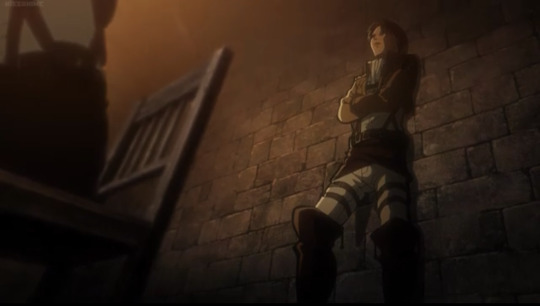

This impression continues when Eren meets Levi and Erwin in the dungeon. Levi is rude and mouthy, and Erwin’s chastisements do little to curb this. Levi’s confidence and skill give him authority issues…right?
So then we move to the courtroom scene, Eren’s trial. Erwin says beforehand that he has a plan, but we’re told nothing more. We see him propose to the court that Eren be given to the Scouts, and he says nothing more.

Levi is the one to scathingly go after the MPs during the debate, pointing out the flaws in their plan and how likely it is that they’re trying to save their own skin. First time viewers might assume that, again, while Erwin is a charismatic leader, he doesn’t go far enough. Levi is the one to say the quiet part out loud, to go to the places Erwin’s too ~respectable~ to go.
Then things start to go sideways. The court’s favor seems to be turning against Eren and the Scouts, fear and paranoia winning out. Eren is getting desperate.
Enter Levi.
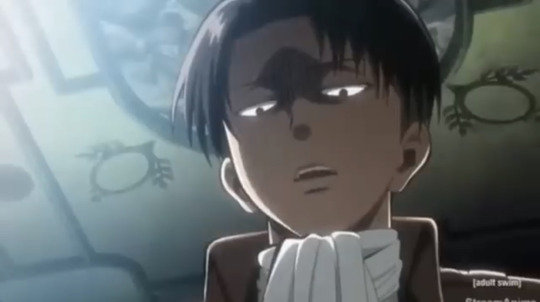
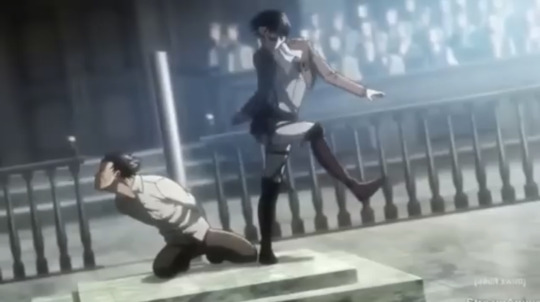

And we get this glorious scene. Levi convinces the court that Eren is harmless to the likes of someone like him. Their best bet is to do what Erwin asked and give Eren to the Scouts. Please.
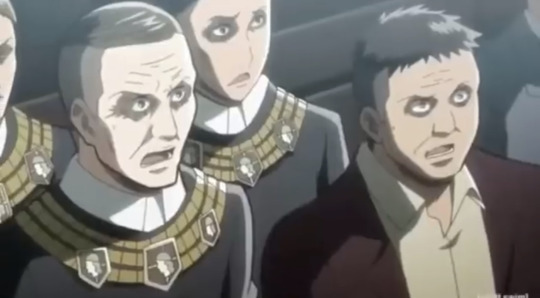
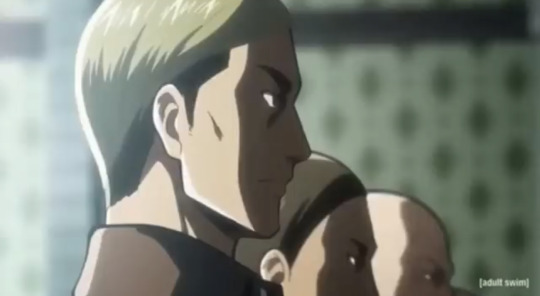
(Notice how Erwin is not shocked, nor does he try to stop Levi.)
Now again, to a first time viewer, this scene feeds into our preconceived notion of Levi. He’s the guy who isn’t deterred by silly things like rank or authority. He saw that things weren’t going Erwin’s way, so he took matters into his own hands. Maybe Erwin will be mad about this later, but Levi will shrug and roll his eyes and say “but I got results, didn’t I?” and Erwin will have no argument for that.
…Right?
Cut to the next scene, after the court has granted the Scouts custody of Eren—and Erwin’s like, “sooo…sorry about that. We had to make it look good.”
This whole thing was planned by Erwin.
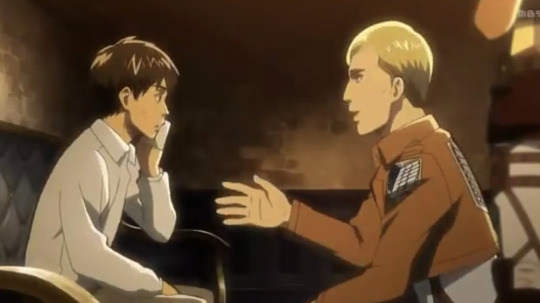
The scene was more or less staged by the Scouts. Erwin wanted to present himself as the calm, collected leader with clean hands. And Levi was the one to do the dirty work, be the brutalizer—even though it was all on Erwin’s orders.
He’ll play that role. He’ll be the rogue, the rough one, the problem child, because his personality fits so well into that niche anyway. But he does it because Erwin wanted him to. If Erwin had wanted him to stand nice and quiet the entire time during the trial, if that’s what needed to be done, Levi would’ve done that instead. He’s not looking to get results; he trusts Erwin’s methods and does what he’s told.
And in this case, he was told to beat up this helpless brat. Gladly.
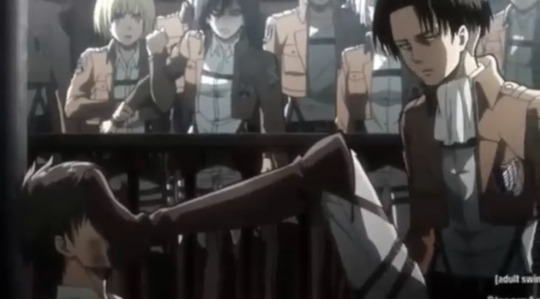
(How much do you want to bet one of the MPs said to Erwin after, “you need to keep your dog under control.” I would simply implode.)
Like, if this display will land anyone in trouble, it wouldn’t be Erwin—it would be Levi. Levi’s the one who got violent and mouthy during a military trial. He broke rank. He attacked the defendant. Erwin isn’t, ostensibly, responsible for this at all. Levi willingly put himself in that position because he trusted Erwin.
And so everything we thought we knew about Levi is turned on its head! Eren even says so in the next episode—he expresses surprise that Levi’s so diligent about following orders.
Eren, silly boy, assumes that being skilled means you don’t have to take orders from anyone. But Levi does. It’s his whole character. (Notice how, despite him ending up being the oldest member of the Scouts, he’s never in line for Commander? He’s the hands, not the head.)
And this whole thing provides so much insight into Erwin’s character as well! Pyxis says at the beginning of the episode that Erwin is very straight-laced. Well, by the end of the episode, we can see that’s…not quite true.
Erwin is conniving, willing to play dirty, do whatever it takes, to get things to go his way. All while keeping his own hands clean, maintaining the image of the honorable Commander. He simply uses the tools at his disposal (Levi) to do the dirty bits for him.
It’s a fantastic introduction to the Scouts, their leader, and his right hand (or is it the left hand that does the dirty work?)
#attack on titan#shingeki no kyojin#levi ackerman#erwin smith#aot#snk#eruri#i am tagging it that but it doesn’t have to be#mymeta#kylerrambles#this of course is not an indictment of either character i LOVE what this says about them!#it’s good character writing!#there! i made a meta post!#feels good to ramble lol
731 notes
·
View notes
Text
Can we talk for a second about how Levi always refers to the members of his squad by their first name. In Japan, referring to someone by their first name is significant. Its more typical to refer to someone by their family name if you don't know them all to well. Close friends even still use honorifics, such as [Name]-chan. There's several instances where Erwin refers to the newer cadets by just their last names, which is typical in a military setting even in other countries, but Levi calls the 104th kids by their names, Armin, Jean, etc.
Levi obviously doesn't care for honorifics or typical social niceties -they didn't really matter where he grew up anyways- but to me him referring to them by their first names -even as they call him Captain (heichou)- means 'we are equals, I trust you'
375 notes
·
View notes
Text
The Psychological and Emotional Impact of Levi’s Early Childhood:
I don’t think Levi’s early childhood really gets discussed enough in the fandom, or the ways in which those experiences in his formative years had to have impacted him. This could be because we don’t really get many panels depicting his childhood. Just a few. But those few panels show us enough for us to extrapolate plenty and form a pretty clear picture of what he went through.
First of all, it’s almost a certainty that Levi was born as the result of rape.
That’s something that I think everyone should let sink in.
He was born in the brothel that his mother, Kuchel, worked in. And “worked” is a relative term here. Kuchel was driven into the Underground as a result of persecution by the royal family. She was undoubtedly very young, she was alone, with no real resources or support or guarantee of safety or protection from anyone, in an environment of criminality and violence. There were likely very few, if any options available to her in terms of her own survival. Her becoming a prostitute wouldn’t have been any kind of a choice then, but rather a move made in desperation. And so I think we can also safely assume that Kuchel’s experiences working as a prostitute were tantamount to forced labor. In other words, a kind of slavery. She was almost certainly paid a paltry sum by the brothels owner, evidenced by the sorry, squalid and destitute state we see her and Levi living in when Kenny comes. She was likely afforded very few, if any rights or defenses against whatever her clients chose to do to her, as also evidenced by the fact that no one seemed to really know or care enough about her or Levi to even realize when she had died.
It’s impossible for me to define any of what Kuchel went through working in such a place as anything less than rape, then.
So, Levi’s very existence is one that is a literal product of violence. I’m absolutely sure that Levi himself is painfully aware of this, knowing that he was born out of his own mother’s pain and suffering. Going into the implications of this on Levi’s psychological health, I think you can safely assume this realization had a very negative impact on his own sense of self-worth. His mother was the only person in his childhood who we ever saw treat him with any kind of actual love or kindness. The only person who ever, actually wanted him. And yet, Levi would have seen demonstrated to him, every day, how his existence in his mothers life placed an increased burden on her, forcing her into increasingly more desperate circumstances, now having to feed two mouths instead of only one, and as a result, likely having to engage in increased, unwanted sexual activity with her clients. So Levi would be aware that not only was his mother, (again, the only person who loved and treated him with tenderness) being hurt on his behalf, but he also would have been aware, after witnessing the particular ways in which she was being hurt, that he himself was the result of that violence. Levi would have been shown that his very existence, then, was something which caused immense suffering and pain to the only person in his life who loved him. I honestly can’t even imagine the negative implications of something like this on a young mind. Only to say, it must have been horrific and resulted in lifelong trauma. Trauma which, due to the desperation of Levi’s life afterward, he likely never had any opportunity or chance to even address.
Now, moving on to something else. There’s a tendency by many to paint Kuchel as this sort of perfect mother figure. Someone who, through the power of her love for Levi alone, was able to overcome the trauma of their general circumstances, to negate the negative experiences he would have been exposed to, resulting in Levi becoming the kind and compassionate person he would be as an adult. But I think this assumption about Kuchel and their situation is not only unrealistic and idealized in the extreme, but also in its way, undermines the actual bleakness of their circumstances.
Again, we have to remember that Kuchel was driven into the Underground, and essentially forced, through lack of any other options, to become a prostitute. Calling her a prostitute is a nice way of saying she had to sell herself into sexual slavery. Kuchel’s own psychological and emotional trauma doesn’t often get touched upon or acknowledged when people talk about her and her relationship with her son, nor does the desperate poverty of their living situation. Kuchel died right in front of Levi, and we can assume with pretty good accuracy that she either died from a sexually transmitted disease, or that she died from malnutrition and starvation. These weren’t two people, then, who were living a comfortable or secure life. In fact, the very opposite. Levi was starving to death when Kenny found him. It’s easy enough to assume from his state of general neglect and starvation that Kuchel, at the very least, was struggling to provide for him. Not just food, but any kind of comfort or care. Clothing, warmth, protection, cleanliness, and very likely even, affection. This isn’t a knock on Kuchel’s worth as a mother, or her parenting. She was, undoubtedly, doing the best she could given the circumstances. But, again, this particular aspect of their lives isn’t touched on nearly enough. Kuchel died out of neglect, impoverishment, desperation and abuse. Given what we can assume her day to day life was like, having to let men come and sexually assault her just to keep herself and her son alive, one has to also consider the emotional and mental toll this sort of existence would eventually have on her. She had to have been exhausted, both mentally and physically. You add to this the always uncertain and present reality of whether either her or Levi would even be able to eat on any, given day, whether she would be able to keep her son from starving to death, and you can start to form a clear idea of how things like “playtime” or “fun”, or freely given and enthusiastic love and affection, would be, tragically, low on the list of priorities. Their situation was absolutely a situation of survival, first and foremost. Luxuries weren’t a part of their lives. Anyone who’s ever experienced extreme deprivation, poverty and desperation on the level in which Kuchel and Levi were living would know that those material realities absolutely have a negative impact on one’s ability to simply live. To be happy. To indulge in fantasy. To indulge in luxury. To indulge in any kind of relaxation or ease of living. It’s nice to imagine that Kuchel was always able to show Levi love and affection. To always be a kind, caring and generous mother to him. But that perception of their lives together ignores the bleak and harsh reality of what was really going on. More likely than not, Kuchel was often too exhausted and in bad, physical shape herself to play with Levi, to pay attention to Levi, to indulge in Levi. It was everything she could do, after all, to simply keep Levi alive, let alone healthy and happy. Kenny described Levi, when he first took him in, as the most unfriendly kid he’d ever met. We rarely see Levi speak at all in those early days with Kenny. That doesn’t speak to someone who is well adjusted socially. That doesn’t speak to someone who received a lot of open love and affection in the formative years of his childhood. Again, this isn’t to criticize or undermine Kuchel’s abilities as a mother. It’s simply acknowledging the tragic reality, that someone in Kuchel’s position, living the kind of life she was living, wouldn’t have had the luxury of being for Levi everything he needed her to be.
This also leads me into another point I don’t think I’ve ever seen discussed, and that has to do with Kuchel’s decision to have Levi at all, and how that choice is, simultaneously, both entirely selfless, and entirely selfish.
Kenny tells his grandfather that he tried to talk Kuchel out of having her baby, trying to explain to her how bringing a baby into the kind of situation she was living in wasn’t viable. It was only going to make, not only her own life worse, but in turn, the baby’s life was going to be awful too. We later see, in Kenny’s memories, a scene in which Kuchel is holding Levi as a newborn against her chest and crying tears of happiness. Kenny recalls this as part of his monologue about dreams, and the desperation of dreams, and the ability of dreams to corrupt us. This is important to acknowledge. Because again, while Kuchel’s intentions in giving birth to Levi were pure, and her love for him was absolutely pure and genuine, still, she DID bring him into a situation of extreme poverty, desperation and violence. In a way, Kuchel prioritized her dream of motherhood not only over her own well being (this being the selfless aspect of her decision), but also over Levi’s well being (this being the selfish aspect). She knew her own living situation was terrible, filled with suffering, cruelty and pain. She knew this, and she was aware, from Kenny’s own words, that bringing a child into that situation was only going to make things worse, for both of them. But she chose to do it anyway. She chose to give birth to Levi, and to keep him, knowing the sort of deprivation and desperation he would be exposed to. Knowing the kind of violence and cruelty and ugliness he would be exposed to, being born and raised in a brothel, in which she was working as a prostitute, relegated to a single room with him in it.
Chances are high, extremely high, that Levi saw his mother raped. Maybe she sent him out of the room when she was with clients. But maybe she wasn’t able to. We never see any evidence of Levi having ever left their single room as a child, and even if he had, the building they were in was a brothel, catering to men seeking and paying for the sexual services of women. It isn’t an environment that is, in any way, suited to a child, friendly to a child, or even tolerant of a child. It’s almost 100% certain that Levi was, at one time or another, exposed to sexual violence against women, whether it was his own mother, or someone else. He would have been exposed to violence in general too, because men who sexually assault women are also very likely to physically assault them. I don’t think it’s any kind of a stretch, even, to assume that Levi himself might have been on the receiving end of physical violence, at the least, in a place like that. Men who wouldn’t want some little kid around while they force themselves on the women there probably would have little qualm with hitting Levi to make him go away.
Again, going back to Levi’s “unfriendliness” when Kenny first takes him in, I think we can extrapolate that a lot of what Kenny was perceiving as unfriendly behavior was in fact just Levi being withdrawn. He seemed sullen and mute to Kenny. We see this in children who have been abused. They tend to go within themselves and make themselves as unobtrusive as possible, not wanting to draw attention to themselves, because whenever they have, it’s always resulted in them somehow being hurt. Levi’s body language when Kenny first meets him speaks to this as well. He’s curled against the wall opposite his mother’s bed, literally making himself as small as possible, his knees hugged to his chest, his head bowed close to them, etc... Like he’s trying to hide. Again, it doesn’t take a stretch of the imagination to assume that Levi fell victim to the violence of the men who frequented that place. The Underground in general was filled with violent and cruel men who made a living out of criminality, who in fact wouldn’t think twice about committing murder, etc...
This is the world Kuchel brought Levi into. A world of physical and sexual violence, a world of depravity and illness, a world of poverty and starvation. Kuchel loved Levi with all her heart. That isn’t for a moment in doubt. But by choosing to have him and keep him, she also trapped him into a life of pain and suffering of his own.
Kuchel had to know, if anything were to happen to her, that Levi’s chances of survival were next to none. He was helpless without her, and that too is evidenced by the fact that, when Kenny finds them, Levi is literally starving to death. He’s just sitting there, resigned to his fate. There’s no indication whatsoever that Levi ever even left their room to seek food, or help of any kind. He just sat there, trapped with his mother’s rotting corpse, waiting to die. And nobody there cared enough to even check on him or his mother in the span of time between when she fell ill and when she died. Nobody there cared enough about either of their lives to see if they were okay, and we can assume, because Levi didn’t seek anyone’s help, that he didn’t think anyone would help him, which tells us all we need to know about how he and his mother were generally treated in that place. Kuchel must have known, as she was dying, that without her, Levi was going to die too. She had no way and no cause to know or think that Kenny would come by to rescue him. And, indeed, if Kenny hadn’t shown up right when he did, Levi almost certainly would have died in that room with her. I can’t even imagine the pain this must have caused her, knowing she was dying, and knowing as a result, that her son was going to die too. It would have been unbearable. But again, this is also the risk Kuchel took when she chose to give birth to and keep Levi. She knew this was a possibility. That her child would die a slow and painful death without her there to protect and take care of him.
So this sort of sunny, idealistic picture that tends to get painted of Levi’s life with his mother seems both unrealistic and unfair to them in terms of understanding their actual situation. This wasn’t a happy or good life they were living together. It was a life full of misery and pain. Levi’s monologue later on to the 104th recruits, about not knowing if you’ll wake up and get to eat that day, or if your friends will still be alive, wasn’t just a reflection on their lives living with the threat of titans. It was a reflection of his own life living in the Underground, living a life surrounded by poverty and violence and uncertainty. That was Levi’s existence for the first 25 years of his life. That was Levi’s childhood. Violence and starvation, cruelty and deprivation. Kuchel’s love, as pure and as genuine as it was, wasn’t enough on it’s own to overcome the scars of all that.
One last note to end this on.
There’s also a tendency to paint Kenny’s rescue of Levi as this very heroic and selfless act on Kenny’s part. A moment in which Levi was pulled from the jaws of certain death and given a chance to live by his uncle. And while, yes, Kenny certainly did save Levi’s life and give him that chance, I think it’s also important to acknowledge that Kenny’s treatment of Levi was abusive, and ultimately caused him more harm than good. Kenny, we have to remember, went down to the Underground to rescue Kuchel. He went to that brothel with the intention of pulling her out and bringing her to live back up on the surface, able to do so now that he had ended the persecution of their family through his connection with Uri Reiss. But by the time he got there, Kuchel was dead, and she’d left behind her only child in Levi. Kenny could have so easily brought Levi up to the surface with him, the way he’d been planning on doing with Kuchel, and given him a good and happy life. He could have saved him from the hell of living in the Underground City. A world of perpetual darkness, a world of constant danger and desperation and illness. People talk about how Kenny gave Levi the tools to survive in such a harsh environment, and treat this as if it’s something to somehow be applauded and praised. But Kenny shouldn’t have had to teach Levi to survive in a cut-throat environment at all. He’d made it possible for those with the Ackerman name to live free of persecution up above. He could have easily taken Levi with him and given him a good, traditional education, fed and clothed him, given him shelter, given him the chance to grow up in fresh air and sunlight, given him a chance to make friends with other children, to learn social skills and just live a normal existence with the opportunity to actually be happy. But instead Kenny chose to keep Levi in the Underground, to teach him how to kill, to teach him to be violent, and not much else, before simply abandoning him there and never going back, forcing Levi to survive on his own in the most dangerous place inside the walls. What Kenny did to Levi wasn’t a kindness. A kindness would have been rescuing Levi from the Underground entirely and giving him a real life above. A kindness would have been Kenny giving to Levi what he’d planned on giving to his sister. But Kenny was too selfish to do that, and that’s the bottom line. He didn’t want to have to take care of and raise a child. He didn’t want the responsibility. Whether that’s tied to Kenny’s own, negative perception of himself or not doesn’t matter. He still chose not to take Levi with him and give him a real life because actually caring for and raising a child would have been too hard, too much work, too much responsibility. By leaving Levi there in the Underground, he sent Levi the message, clear as day, that he wasn’t wanted. And so Levi spent the entirety of his childhood, and a good portion of his adulthood, believing that, and living in the Underground, living a life of violence and desperation and suffering.
I don’t think the suffering Levi went through as a child gets discussed or acknowledged enough, or examined enough. I don’t think people often look at it with enough objective realism to realize the extreme harm and trauma Levi experienced and was left with. It’s genuinely a miracle that Levi turned out the way he did. That Levi is as good a man as he is. Nothing in his life growing up can really account for that. Everything in his life growing up would evince that he should have become the sort of man Kenny was, selfish and cruel. It’s truly against all odds that Levi became the exact opposite. Selfless in the extreme, kind, caring and compassionate above and beyond anyone else in the series. Someone who fights for and gives his life in dedication to the dreams and lives of others.
In many ways, Levi is, himself, the greatest miracle of all.
766 notes
·
View notes
Text
Levi and Post-Traumatic Stress Disorder
TW: mentions of rape and childhood sexual abuse
Throughout the course of Attack on Titan, and even before the canon timeline, Levi experiences innumerable traumas, not the least of which are repeatedly experiencing the deaths of his closest friends and comrades. By the end of the series, Levi has lost every single person he had been close to, being the last of the Survey Corps' veterans. Given the truly immense amount of traumatic events Levi suffers, it'd be difficult to believe that he wouldn't have post-traumatic stress disorder (PTSD), and indeed, he does display several key features of the disorder.
Paraphrased, the DSM-5-TR PTSD criteria are as follows (American Psychiatric Association, 2022, p. 301):
Criterion A: stressor (one required)
The person was exposed to: death, threatened death, actual or threatened serious injury, or actual or threatened sexual violence, in the following way(s):
Direct exposure
Witnessing the trauma
Learning that a relative or close friend was exposed to a trauma
Indirect exposure to aversive details of the trauma, usually in the course of professional duties (e.g., first responders, medics)
Criterion B: intrusion symptoms (one required)
The traumatic event is persistently re-experienced in the following way(s):
Unwanted upsetting memories
Nightmares
Flashbacks
Emotional distress after exposure to traumatic reminders
Physical reactivity after exposure to traumatic reminders
Criterion C: avoidance (one required)
Avoidance of trauma-related stimuli after the trauma, in the following way(s):
Trauma-related thoughts or feelings
Trauma-related external reminders
Criterion D: negative alterations in cognitions and mood (two required)
Negative thoughts or feelings that began or worsened after the trauma, in the following way(s):
Inability to recall key features of the trauma
Overly negative thoughts and assumptions about oneself or the world
Exaggerated blame of self or others for causing the trauma
Negative affect
Decreased interest in activities
Feeling isolated
Difficulty experiencing positive affect
Criterion E: alterations in arousal and reactivity (two required)
Trauma-related arousal and reactivity that began or worsened after the trauma, in the following way(s):
Irritability or aggression
Risky or self-destructive behavior
Hypervigilance
Heightened startle reaction
Difficulty concentrating
Difficulty sleeping
Criterion F: duration (required)
Symptoms last for more than 1 month.
Criterion G: functional significance (required)
Symptoms create distress or functional impairment (e.g., social, occupational).
Criterion H: exclusion (required)
Symptoms are not due to medication, substance use, or other illness.
--
I've indicated the symptoms that apply to Levi, or that I believe likely apply, based on canon content in purple. Let's go one by one.
Criterion A: stressor
During the canon timeline, Levi was exposed to both large amounts of death and threatened death, primarily due to titan casualties, but also due to the circumstances of poverty and deprivation in the Underground. Notable examples include witnessing his mother die and decay while he starved as a young child; Furlan and Isabel's deaths; the deaths of Petra, Oluo, Gunther, and Eld during the Female Titan arc; the loss of Kenny; Erwin and the new recruits' suicide charge against the Beast Titan; and Hange's sacrifice.
Levi experienced multiple instances of serious injury, with the most significant being his injuries resulting from the thunderspear explosion and the Battle of Heaven and Earth. Given the nature of blast injuries, it is likely Levi suffered from internal damage—in particular, rupture of the respiratory and hollow organs, such as the lungs and bowels. We're also shown he suffered complete separation of the index and middle fingers of his right hand, as well as ocular damage to his right eye. A concussion and perhaps a traumatic brain injury following the blast is also likely, as well as hearing damage. Following the Battle of Heaven and Earth, he also experienced significant injuries to one of his legs, necessitating the use of a wheelchair three years post-Rumbling.
In regard to actual or threatened sexual violence, Levi was born and lived in a brothel, in which his mom was a prostitute. It's not an exaggeration to say Levi was likely the result of rape. Given the circumstances of his upbringing, it's also likely he witnessed the sexual encounters between his mother and the brothel's patrons and was perhaps sexually abused himself when his mother was unable or unavailable to protect him. Given the Bad Boy panel previews, we also know he was directly threatened with sex trafficking on at least one occasion.
Only one stressor is required to meet this criterion, and Levi meets all of them. He very much fits the profile of someone with complex trauma or C-PTSD, although that diagnosis has not yet been added to the DSM.
Criterion B: intrusion symptoms
Canon evidence of intrusion symptoms is a bit harder to find, given the heavy plot focus of Attack on Titan; however, I do believe there is enough to make some inferences.
During the Uprising arc, Levi takes note of a starving woman with her baby on multiple occasions, who appears to remind him of his mother. This indicates to me that he thinks of his mother and the circumstances in which he grew up with her with some regularity.
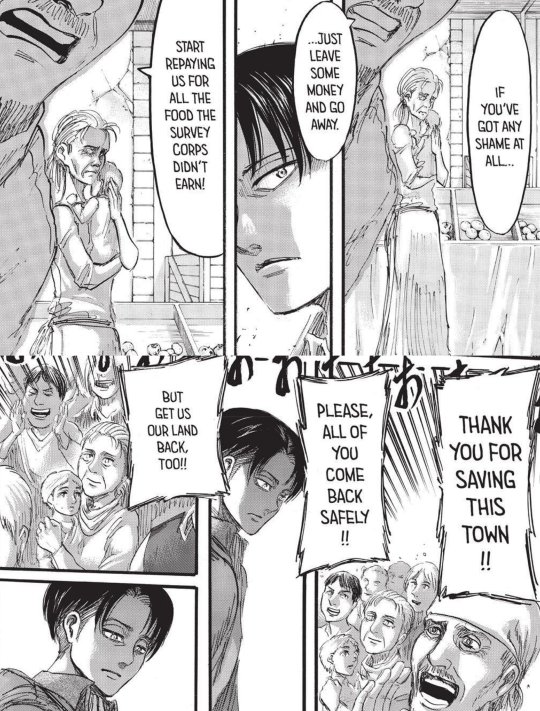
When he later confronts Kenny in the same arc, he specifically questions Kenny regarding the relationship he had with his mother, again indicating that Levi's mother took up significant space in his thoughts.
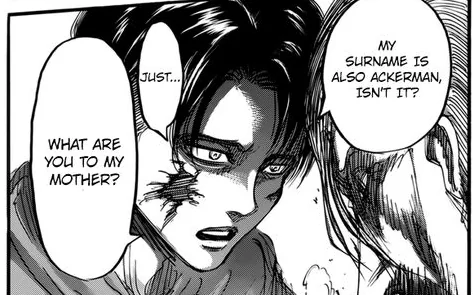
While we know Kuchel chose to keep Levi (rather than abort him), thus indicating Levi was a desired baby, it's evident that Levi's upbringing overall was damaging and distressing due to the severe poverty, food insecurity, and violence he endured as a young child. Accordingly, it's safe to assume that these memories related to his mother were likely to be both unwanted and upsetting.
We also have this panel during the War for Paradis arc, during which Levi ruminates on the deaths of his comrades and the purpose behind having saved Eren's life so many times. His facial expressions are truly crushing and filled with deep despair.
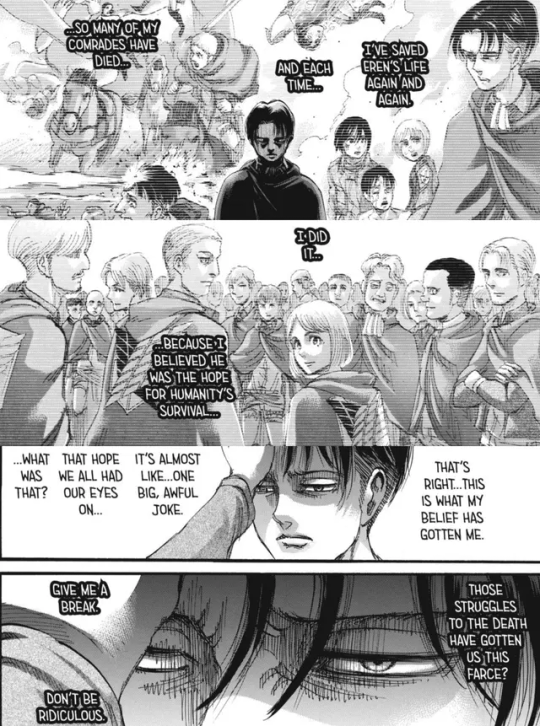
In terms of nightmares, we know that Levi experiences some truly disturbing dreams from the "Smartpass Good Night, Dear and Sweet Dreams Vol. 02" short story, in which he envisions his closest comrades all morphing into a sea of blood on a red carpet. Clearly, the affect of his dream has been influenced by the specter of death constantly looming over him.
Criterion C: avoidance
The full phrasing of this symptom (trauma-related external reminders) is, "Avoidance of or efforts to avoid external reminders (people, places, conversations, activities, objects, situations) that arouse distressing memories, thoughts, or feelings about or closely associated with the traumatic event(s)." Similar to the unwanted upsetting memories symptom under Criterion B, there is not direct canon evidence, but I do believe there is enough to make some inferences.
Primarily, what sticks out to me about Levi is the fact that no one near him seems to have knowledge of his past, which indicates he does not talk about it. When his past is brought up, it's always people who have some direct knowledge about it speaking on it (e.g., Kenny or Erwin). This is shown both directly in canon, such as when Petra speaks to Eren regarding the rumors of Levi's recruitment into the Survey Corps, and in supplemental Smartpass content, like the Close Up interview with Erwin and Levi.
This comes across to me as an effort to avoid conversations, and thus, reminders and memories about the topic.
Criterion D: negative alterations in cognitions and mood
There's quite a lot of evidence for these in canon.
In terms of overly negative thoughts and assumptions about oneself or the world, Levi has plenty. He appears to have the persistent belief that he only exists to be of service and use to others; he views himself as a tool, one which has no value if he is not directly contributing to something. This is exemplified by the following panels:
When Erwin asks Levi if he would be willing to be in charge of keeping the titan serum and determining whom to use it on, Levi answers with, "Why would you bother asking me?" This shows that Levi has no regard for his own personal feelings.
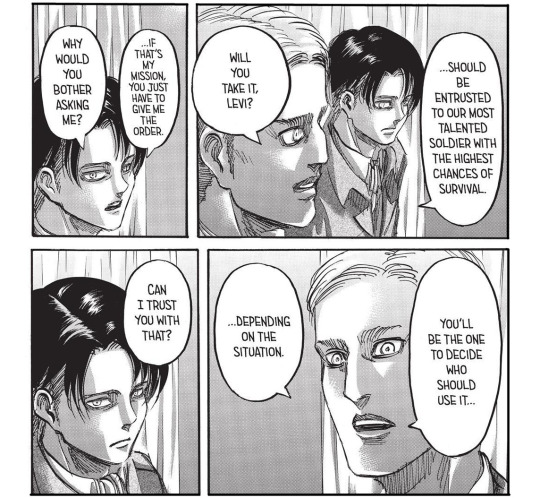
When Erwin and Levi are discussing the plan to take down the Beast Titan during the Reclamation of Wall Maria, Levi expresses his agreement with the plan by remarking that taking down the Beast Titan will act as him "[making] amends for failing to kill that armored brat earlier." This shows that Levi viewed it as his responsibility, and thus, his failure to take down Reiner. He placed an undue burden on himself here, casting blame for outcomes that should not be solely attributed to him.
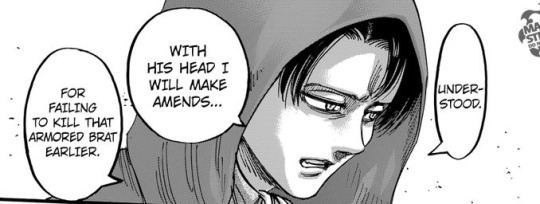
And then there's this panel in the lead-up to the final battle, in which a severely wounded Levi is being reprimanded by Armin for being reckless and not resting, in light of his injuries. Levi responds, "... You want me asleep in bed? You're going to forget I even exist if I rest any longer." Levi suffered truly disabling injuries, and yet, he shows complete disregard for himself—concerned that no one will remember him if he is not actively fighting. This shows a projection of his own lack of self-worth onto how he believes others view him: if he is not useful, then he does not matter. Levi also shows disdain at the concept of resting and having been asleep, as if that's somehow a sign of laziness on his part, which is of course, untrue. No one would have faulted him for resting—he truly needed and deserved to rest.
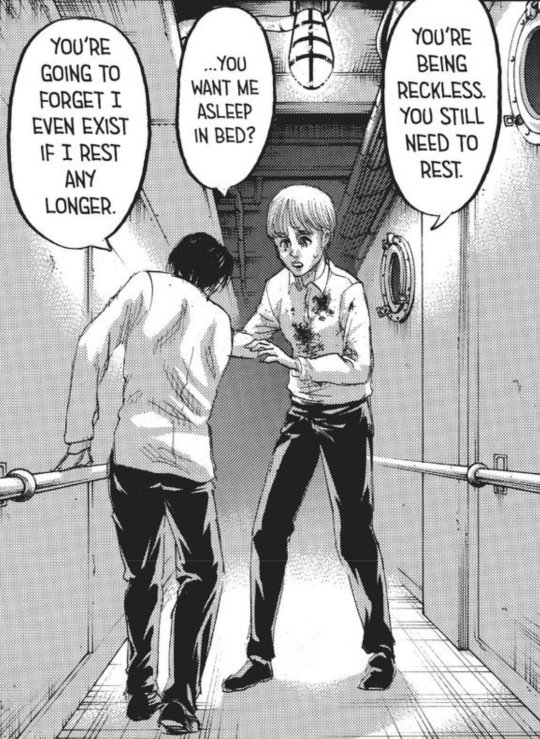
We also know that Levi blamed himself for Kenny leaving him, which can be surmised from interviews with Isayama and the expression on Levi's face when Kenny abandoned him. Levi also asks Kenny why Kenny left him, which shows a certain preoccupation on Levi's part, wherein he worried there must have been something inherently wrong with him to make Kenny leave.
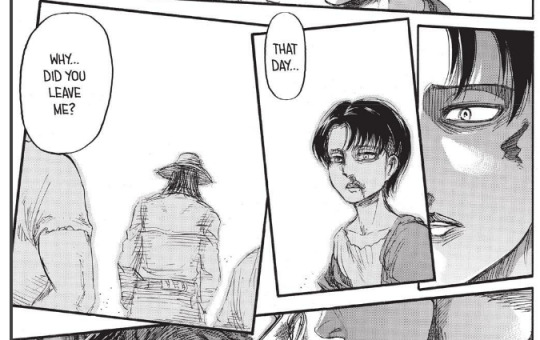
On the topic of Kenny and Levi, Isayama is quoted as saying:
"Levi still had the experience of being separated from Kenny during his childhood. He was constantly troubled by the thought of "Kenny left because I couldn't fulfill his expectations." When the Uprising occurred within the walls, and he confronted Kenny again as an enemy, Levi sought to meet what couldn't be satisfied previously." (x)
Regarding both negative affect and difficulty experiencing positive affect, Levi's expression and mood is frequently shown as depressed. There's a great post by @cosmicjoke on the topic. In terms of the latter, Levi laughs and smiles so infrequently that it's a significant moment at the conclusion of the Uprising arc when he smiles after Historia playfully punches him.

For decreased interest in activities, the full phrasing is, "Markedly diminished interest or participation in significant activities." Levi's character is contrasted with all the other characters in the series in the sense that he has no dreams of his own. Both Armin and Hange have that greater curiosity about the unknowns of the world, represented by the sea and titans; Erwin is similar in that he desired to validate his dad's theories about the outside world and the existence of other humans; Eren craved freedom above all else; etc. Levi, on the other hand, is never shown as having those same dreams and ambitions. Hence, I would say he demonstrates a markedly diminished participation in significant activities, as even though his complete lack of self-interest is immensely admirable, it is also deeply tragic—particularly as dreams and ambitions are often crucial for one's psychological well-being.
And then we also have feeling isolated, for which the full phrasing is, "Feelings of detachment or estrangement from others." On the topic of Levi and relationships, Isayama is quoted as saying, "It’s likely because he is afraid of forming close relationships. Because he exists in a world where one can be eaten by a Titan at any time, he consistently avoids building 'family'-like connections with others." (x)
This manga panel is a good example of how Levi views himself as detached from others. Pay attention to the phrasing: "And I doubt normal people think about these things on a daily basis... So that means I'm abnormal... Probably because I've seen far too many abnormal things."
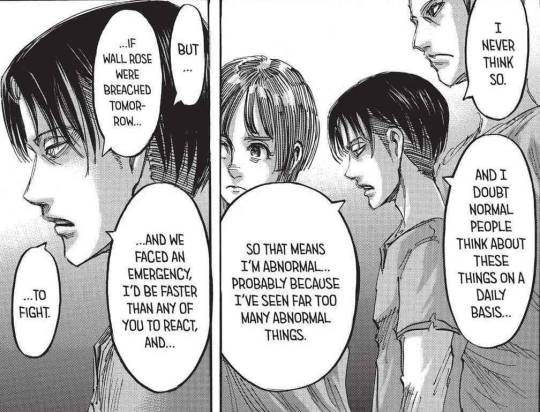
Criterion E: alterations in arousal and reactivity
With all of the above laid out, Criterion E becomes very easy to meet.
For irritability or aggression, this is one of Levi's known character flaws, borne as a result of his upbringing.
For risky or self-destructive behavior, we have clear instances of Levi engaging in battle to the detriment of his physical well-being.
For hypervigilance, the last manga panel I attached provides a good example of that.
For difficulty sleeping, Levi is famously an insomniac, often quoted as getting 2-4 hours of sleep a night.
Criterions F, G, and H: duration, functional significance, and exclusion
Have the duration of Levi's symptoms been greater than one month? Yes.
Do the symptoms result in distress or functional impairment? Yes.
Are the symptoms more attributable to the physiological effects of a substance or another medical condition? No.
Thus, Criterions F, G, and H are met.
Citations
American Psychiatric Association. (2022). Trauma- and stressor-related disorders. In Diagnostic and statistical manual of mental disorders (5th ed., text rev.).
#attack on titan#shingeki no kyojin#levi ackerman#medium: anime/manga#anime: snk#c: levi ackerman#my thoughts#snk meta#I wrote this instead of doing my grad school work#goodness poor Levi#He suffers so much
78 notes
·
View notes
Note
can you talk about kuchel and levi pls i loved your last post abt levi
Hi, thank you so much for your question! I'm really excited because this is the first time I've received an ask like this :) Thank you as well for your kind words on my post!
Off the top of my head, I'll lay out some of my thoughts in general about Levi and Kuchel and some of the speculations I have regarding the circumstances they were in together:
Kuchel seemed to be a victim of sex trafficking. She fled to the Underground City to escape persecution, but prior to that, we can assume that she lived a relatively sheltered and privileged life, as the Ackermans served and protected the King. Because of this, it is unlikely she would have had the skills or knowledge to defend herself once reaching the Underground, so I'm assuming she was preyed upon—especially since it doesn't seem like she ever awakened her own Ackerman powers. We also know that human trafficking is common underground, given Mikasa's backstory and some of the "Bad Boy" panels that have been released.
Given that Kuchel became pregnant with Levi by one of her patrons while working as a prostitute, Levi is essentially the product of rape; Kuchel's occupation was more akin to forced labor and sexual slavery than it was willful employment. I'm certain the circumstances of his birth were never lost on Levi, as I'm sure he witnessed his mother being forced to have sex on a highly frequent basis due to their living arrangements.
To elaborate, I'm fairly certain Kuchel and Levi lived in the brothel she worked at. When Kenny went to search for Kuchel's address, the man he spoke with referred to her as "Olympia" (her prostitute name). That man was also aware of her health status in reference to her ability to see clients, so I'm assuming he was the brothel owner. Building upon Levi witnessing the sexual violence toward his mother by her clients, the reason I think this is the case is because I doubt Kuchel would have felt secure in having Levi leave the room. Given the danger of their situation and how hostile of an environment the Underground is, Kuchel would have wanted to ensure Levi's safety from kidnappers by keeping him in her presence. From what we see of the room Levi was in when Kenny found him, there was only one relatively small bed and a paltry amount of furniture. Not many places for Levi to hide, unfortunately.
The likelihood that Kuchel had postpartum depression (PPD) is quite high, as certain psychosocial circumstances increase the risk factors for developing PPD: stressful life events during the pregnancy, unplanned pregnancy, food insecurity, violence against women, low socioeconomic status, low social support, single marital status, sexual abuse history, and more. All of these aforementioned factors apply to Kuchel. It is exceedingly unlikely Kuchel would have had access to treatment for any PPD she may have had as well. Furthermore, it is well-known that PPD can adversely impact the maternal-infant relationship, particularly untreated PPD. This would have affected not only Kuchel's ability to attend to her own needs, but also Levi's needs.
Levi was dying from starvation when Kenny found him. I imagine Levi was stuck with his mother's decaying corpse for around a week, and one does not reach that level of starvation from going without food for a week. Simply from those panels alone, it is evident Levi had probably gone without sufficient access to food for months at a time. This demonstrates that Kuchel was having significant difficulties providing for Levi's basic needs. Based on this fact alone, Kuchel would not have had the capabilities and resources to provide Levi with higher-level needs, like the feelings of love and belonging that children need to thrive. I think Kuchel clearly loved and wanted Levi deeply, just based on the panel of her crying tears of happiness while holding Levi as an infant; however, the reality of her situation would have precluded her from properly relaying this love to Levi.
Let's take a look at Maslow's hierarchy of needs:

Basically, human needs are arranged in this hierarchy, with lower-level needs required for survival having to be satisfied before moving on to higher-level needs. Higher-level needs cannot be met if lower-level needs are not. The more one progresses through this hierarchy, the harder it is to continue to move through the hierarchy due to the practical and interpersonal barriers that inevitably occur. Physiological needs are the most important because no other needs can be satisfied unless those are met. Practically none of Levi's physiological needs were being met during his childhood:
We've established he had no food.
Given the poverty they were in and the nature of the Underground, a lack of clean drinking water makes sense.
The barest minimum of shelter was provided, given the small room they lived in. The shelter itself was inadequate and unsafe.
Levi was dressed in rags when Kenny found him, so we can extrapolate that he did not have much clothing.
Due to the lack of sunlight and the known effects on circadian rhythm, as well as Levi's known issues with insomnia during adulthood, consistent sleep was also an issue.
Clean air quality also seems like it'd be an issue Underground, given the lack of electricity. Torches and oil lamps probably contributed significantly to air pollution, along with the proper lack of air ventilation.
On a different note, we know from Kenny's conversation with the man who I assume was the brothel owner that Kuchel got sick from one of her clients. Of course, it's possible that Kuchel may have gotten some other sort of illness from her client, but given the occupational hazards of her labor, I'm assuming this was a sexually transmitted disease (STD). We already know Levi is extremely wary and concerned about disease when he's older to the point of being seen as a "clean freak"; it seems pretty easy to trace this concern to his experiences living underground. Given how Kuchel became sick, it's not a leap to think Levi might associate sex with disease, especially if he ever learned about the concept of STDs. Levi probably internalized some very negative messages and associations regarding sex from his childhood with his mother.
Anyway, those are some of the basic thoughts I have in my head regarding Kuchel and Levi's circumstances. I do have some more, so I would definitely love to write more posts at some point on this topic. Thanks again for reaching out!
#attack on titan#shingeki no kyojin#Levi Ackerman#Kuchel Ackerman#aot#snk#attack on titan meta#shingeki no kyojin meta#c: levi ackerman#c: kuchel ackerman#r: kuchel & levi#aot.meta#meta.levi#meta.kuchel#ask#asks#my thoughts
61 notes
·
View notes
Text
Reiner doesn't want to, he doesn't really feel like it, but there's no way he can win an argument against Annie right now
Fandom: Shingeki No Kyojin / Attack on Titan (manga spoilers!)
Relationships: Reiner & Annie, minor Armin/Annie
Summary:
Early in the morning, Reiner goes out to run with Annie.
Set 4-6 months after the Rumbling.
CW: Depression, some vague suicidal thoughts.
Written for @julybreakbingo, prompts: "Would you like to observe? You might learn something." + "Kiss my ass."
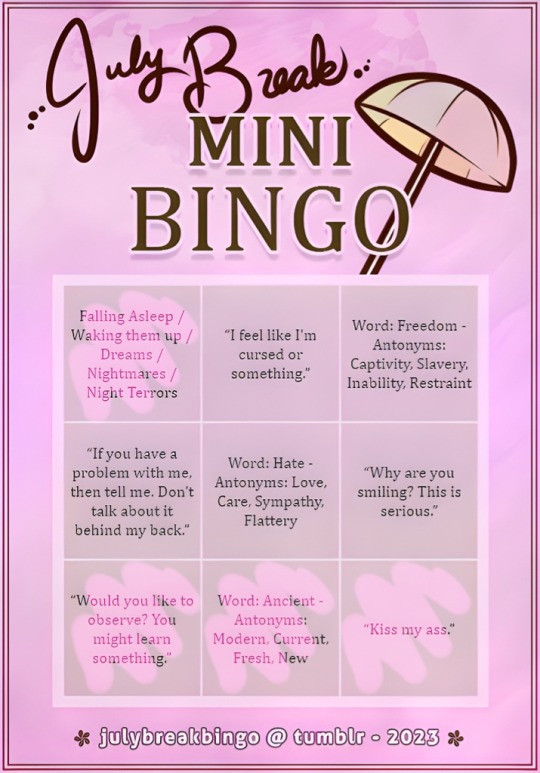
#aot#snk#reiner braun#annie leonhart#reiner braun fic#shingeki no kyojin meta#attack on titan#aot fanfic#aquietjune fics#july break bingo#july break bingo 2023#aot spoilers#running#aquietjune jbbingo2023
3 notes
·
View notes
Text
I wanted to talk about this scene for a while now:




First of all, when Mikasa obviously very upset and raged up by female titan kidnapping Eren, she vents her anger out by blaming Levi for not being able to do his job of protecting Eren. I don't think she knows much about how the whole squad got killed by Annie.
But, Levi instead of snapping at Mikasa or getting offended by her furious statement, he chooses to not react on it. He just saw his squad dead and is definitely depressed.
The look on his face after Mikasa said that, turns grim and he looks too tired. He looks like that while returning from expedition and facing Petra's dad too. I think, the statement actually hit him more than it shows. It looks like he ignored it, but the grim look said otherwise.
He was definitely blaming himself for not reaching out there in time to save his precious squad members and was already suffering from their loss of lives. And Mikasa's statement worked like lemon on wound.
He didn't react, it's not like him. He also is a very understanding adult, for he chooses to not think Mikasa as rude for saying that. He understands she is just 15 and how Eren is a special person for her, having him taken away and endangered always make Mikasa recklessly furious. But also, I think, he thought that those words were true, he thought that it was his shortcoming for not reaching there on time.
He understands that he can't save everyone, but it's this sad realization for him that pains him the most. Being called humanity's strongest and then not being able to wondrously saving them. He sure lost and sacrificed the most, considering his closest people and friends are all dead.
He is too selfless and goal oriented ( saving and protecting humanity) that he won't wallow in self pity and he never did strike me as someone who would ponder over things he couldn't control, he did rather do something productive and make a difference. But this feeling of not being or doing enough definitely always there somewhere in his mind, he just brushes it off and focuses on what he can still do.
He lost his whole squad too, but he chooses to put aside his pain and understand Mikasa's. He was never the one to complain about his life either. He is just to selfless to do so.
This scene was a really good point for his character, how he is an understanding and thoughtful adult. How he does get affected by deaths severely and doesn't show it. How he might actually blame himself for not being able to save lives.
I don't think Levi would have too much guilt, in a way Erwin did. But he definitely sometimes blame himself for what's lost, that is not even his fault. And just shows how even a person who has been through and seen so much deaths and suffering, can still be so vulnerable to it.
Levi has treated every life as precious and meaningful, loss of this life he considers so precious and not being able to do anything, when situation is totally our of his hand, can make him depressed too. As I already said, he would still brush off those thoughts and not ponder on it. He would rather do whatever he can to help, to make sure that those lost lives weren't in vain.
For Levi not only life has meaning and worth but death does too, he will do everything in his power to give meaning to both the lives and deaths of his comrades.
#levi ackerman#attack on titan#aot#levi aot#levi attack on titan#levi#shingeki no kyojin#levi fanart#levi character analysis#kikarou rambles#aot meta#kikarou metas
136 notes
·
View notes
Text
people like to characterize levi as the guarded one, and while that's not an unfair assessment, levi is emotionally guarded, not personally guarded. levi is unflinching in his pursuits, his values, he leaves nothing to the imagination. he's unapologetically himself and regardless of what happens he can't seem to shake his internal drives: his continued belief in fighting for better, in honoring others, in acting in service of things beyond him.
its actually erwin who i feel is the inverse, erwin is clinical, he's constantly crafting, which doesn't negate his sincerity, one of his major components is sincerity, but its an obligatory thing, smth afforded to others. erwin uses service as a mechanism to achieve his actual ideals, whereas levi is driven by service as an outlet for his individualism. however, erwin's passion is what makes him such a good leader. naturally.
eruri are both on the introverted side, hence their symmetry, the onus of externalization and adjustment is eliminated, they're attuned to one another. levi provides certainty and erwin direction. and they both feel safe within that, however, bc erwin had to kill a key part of himself, burying his deviance in order to ascend, he defers to half-truths and obfuscation, its a safety mechanism, the only way attaining power to realize his true passion was possible. the passion we see is only residual, indicative of the flame that truly burns within.
erwin affords only glimpses.
he's paradoxical in that — an at heart withdrawn, observant kid with a fire bright enough to fashion him into the devil. someone subsumed by that which they buried.
he internalizes all the horrors and lets little else color him in the eyes of others bc they have been his persistent norm, he buries his in actuality, juvenile and senseless self, and in doing so, the person he sees as a paragon, the person who the people idealize sees one often framed as cold and unfeeling by others as the truly elevated one, bc in burying his own light, erwin is able to see it in levi.
#eruri#aot meta#erwin x levi#erwin smith#levi ackerman#shingeki no kyojin#aot eruri#snk eruri#levi aot#captain levi#aot erwin#commander erwin#aot#snk
144 notes
·
View notes
Text
What I like about Eren as a foil to the warriors is that the warriors grew up amid abuse and terror but still chose to love each other and do what they thought was right, while Eren grew up with all the love and support in the world but still desired to destroy the world.
The warriors had nothing and wanted to make the world better for their beloved, no matter how much they were tricked and used by the world and their beloved for that goal. Eren had everything but wanted to make the world worse for everyone, no matter how much he had to trick and use the world and his beloved for that goal.
Eren was always going to destroy, because to hurt indiscriminately is in his nature. Just as the warriors would always choose to love, because to carry others' burdens is in their nature.
#SnK#Shingeki no Kyojin#Attack on Titan#AoT#Attack on Titan the final season#Eren Yeager#Reiner Braun#Bertholdt Hoover#Annie Leonhart#Porco Galliard#Pieck Finger#Marcel Galliard#elidian meta#nonship#spoilerless#safe
132 notes
·
View notes
Text
it was mutual. right around the time levi learns that erwin's intentions with leading the survey corps aren't completely pure, erwin later is surprised to learn that levi has killed people.
in this case, i think erwin too learns that there is no idolizing levi. specifically being nothing but a force for good only. that he "can do no wrong".

the 1st time levi's feelings about erwin's reveal was directly brought up, it was during their argument about convincing erwin to stay behind. in a nutshell, levi didn't think it was safe, but it was what erwin wanted, so he let him.
the 2nd time, it was the last time they would speak, where the implication is that levi accepts this about him.
i think the two instances in the opposite case were 1st when erwin asked levi if he would take the responsibility of the syringe, and giving it to the person on the brink of death who would need it; specifically, erwin emphasizes that levi should get it and not himself because he is injured, and levi is better at making spur of the moment decisions. levi doesn't understand why he felt the need to ask if that is his mission.
yes everything erwin said is logically true, but still, why does levi get to decide who gets it over erwin? i think that question is why erwin asked levi instead of ordering him, and levi knows it too. erwin even asks "can i trust you with that?" but levi in return just asks what erwin's plans are if erwin's dream comes true.
i think the truth is that levi doesn't know if he can make that choice at this point. levi has not just chosen who should die for the sake of their mission now, but he has killed directly for erwin's dream - those members of the military police specifically - but not who should live.
i think that curiosity is why erwin asks instead of orders him. but levi doesn't consider what he can or can't do, or what qualifies him as morally good or not, when he answers. it's the case that if erwin wants him to do it, then he will.
hence why erwin would directly ask "can i trust you with that?"

i think he wants levi to think of himself - because after all one should wonder what guilt erwin feels for indirectly causing levi to murder human beings - but unlike with going on the expedition, levi won't give him what he wants. (which i feel the need to comment is almost a mirror of eren and mikasa's dynamic.)
the second and last time this is ever directly addressed - but still deeply subtextual - is when levi takes the decision of who should die and applies it to erwin and the cadets. he kills them. he will even do this too, because freedom from his dream is what erwin wants, but cannot and would not ask for. and of course later on, he would also make the decision of who should live.
tldr, levi's takeaway was accepting that erwin's dream was (i'll say for simplicity of discussion) the most important thing to him regardless of the harm it can or has caused to himself and others. levi doesn't agree with feeling that way, but regardless.
on the other hand, erwin's takeaway was accepting that levi has no concern about how guilty he should feel if it's in pursuit of erwin's dream, which in erwin's mind must diametrically oppose who levi is; levi is devoted to him whatever the context may be. erwin also wouldn't agree with this, but regardless.
#this is mainly word vomit sorry... but an observation i couldn't not write about#eruri#aot meta#aot#snk#attack on titan#shingeki no kyojin#erwin smith#erwin aot#levi aot#levi ackerman#levi snk#captain levi#commander erwin
41 notes
·
View notes